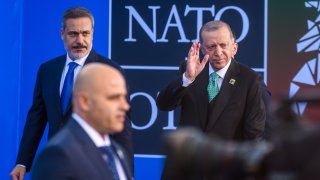NATO’s Rogue State
Congress has options for holding Turkey’s anti-alliance behavior accountable.
Turkey continues to undermine U.S., Israeli, and Western interests. President Recep Tayyip Erdogan must stop supporting Russia, cease undermining the NATO alliance, and end backing for Hamas. This week’s NATO summit in Washington, DC, provides an ideal opportunity for Turkey to show that it seeks to mend its ways. If Erdogan fails to act, the U.S. Congress must punish Ankara.
Turkey’s destabilizing policies are manifold. First and foremost, Erdogan postponed Sweden’s ascension to NATO in order to extract concessions from the alliance. These included a deal with Washington earlier this year to purchase F-16 fighter jets. Only five years earlier, America had kicked Turkey out of the F-35 advanced fighter jet program. Yet, Erdogan subsequently conditioned his approval of Sweden’s NATO membership on Ankara’s acquisition of new fighter jets from Washington. The F-16 sale thus constituted a compromise: Turkey already operated F-16 fighters, so Washington was merely expanding Ankara’s fleet. However, Turkey’s malign conduct should preclude any further arms deal with the United States.
Turkey has expanded its military in other ways, too. Ankara purchased the Russian S-400 air defense system, which poses a threat to U.S. air superiority, including the F-35 planes that make up the bulk of the U.S. flying force. In a related development, Erdogan sold drone parts to Iran even as Turkey built a drone factory in Ukraine, effectively playing both sides of Moscow’s war to secure additional cash for Turkish manufacturers and exporters.
Erdogan has also fueled the Israeli-Palestinian conflict: The events of October 7, 2023, have accentuated Ankara’s longtime support of Hamas. Alarmingly, Erdogan did not condemn the terrorist group’s atrocities. Instead, Turkey has continued to serve as a base of Hamas operations and fundraising. Israel’s Shin Bet security service recently thwarted a Hamas terror attack organized and financed in Turkey that would have resulted in mass casualties of Israelis.
In this context, Congress has several tools at its disposal for addressing an increasingly radical Turkey. In particular, Erdogan’s close relationship with Moscow has left Turkey vulnerable to U.S. sanctions that could limit the political insulation Turkey receives from its membership in NATO. To facilitate these sanctions, Congress should require the intelligence community to compile a list of Turkish economic sectors, including financial institutions and manufacturing companies, that support the Russian war effort.
Congress and the Biden administration can also undermine Turkey’s support for Hamas. As part of a supplemental appropriations bill signed into law in April, Congress adopted the language of the Hamas and Other Palestinian Terrorist Groups International Financing Prevention Act, which provides new authorities to target individuals, entities, and foreign states that provide material support for Hamas and other Palestinian terror groups. The legislation thus enables Washington to sanction international financial networks and government officials—in Turkey and beyond—who enrich Hamas.
Likewise, Congress can continue to pressure Turkey to combat terrorism financing within its territory, including that of Hamas. The Financial Action Task Force (FATF), which sets global standards for combatting money laundering and terror finance, added Turkey to its “grey list” in 2021, deeming that Turkey has significant problems controlling its financial sector from abuse by nefarious actors. However, just last month, the FATF removed Turkey from the list. Congress should make the case for the FATF to return Turkey to the grey list until Ankara can provide evidence that Hamas is not using Turkey’s financial sector to fund terrorism. Congress should also continue to push Ankara to reform its domestic terrorism finance laws and enforcement.
U.S. lawmakers also have leverage that could limit the impact of the F-16 sale. While Congress and the Biden administration have given the green light to the $23 billion purchase, how Ankara will maintain the fleet and acquire replacement parts remains up in the air. Erdogan is seeking a path to U.S.-Turkey coproduction that would allow Ankara to control the supply chain for maintaining the aircraft, thereby freeing Turkey from the need to rely on the United States in the future for aircraft parts. Congress should oppose Erdogan’s scheme by making clear that it will prevent U.S. funding of any coproduction agreement that Washington and Ankara may entertain in the future.
Congress can also push back on Turkey’s sale of drone parts to Russia and Iran. The Biden administration has taken some steps to sanction Turkish drone manufacturers, but they are not enough. Congress should mandate a report by the Office of the Director of National Intelligence on supply chain components used in Russian drones against Ukraine. Utilizing the data in this report, lawmakers should then ban companies that facilitate the chain from participating as subcontractors or suppliers for the U.S. Defense Department or for weapons and arms manufactured by U.S. companies to sell to other countries in NATO. Such steps would further exacerbate the reputational risk in the Turkish economy and dissuade foreign investment.
Collectively, these congressional efforts would send a signal to Erdogan and the Biden administration that Washington will not sweep Turkey’s bad behavior under the rug. Policymakers should take Erdogan at his word when he openly supports terrorism against Israel, advocates for Hamas and Russia, and weakens NATO. The United States must act accordingly.
Tyler Stapleton is director of congressional relations at the FDD Action. Follow him on X: @Ty_D_Stapleton.
Boris Zilberman is director of public policy and strategy at the Christians United for Israel (CUFI) Action Fund. Follow him on X: @rolltidebmz.
Image: Shutterstock.com.

